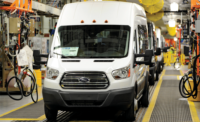Battle of the Vans Rages On As Truck Makers Redefine the Urban Contractor’s Rolling Office
You can blame Dodge for starting the battle of the vans. While the basic Ford Econoline has defined these trusty tools for decades, Chrysler’s 2003 introduction of the sporty Sprinter was an overnight hit and drove Dodge’s segment share from 0% to more than 20%. With sales of cars retreating and stimulus money on the way, others now want a piece of the commercial pie.



Though the economy has been lagging, the market for work vehicles has remained fiercely competitive, and the battleground is the urban contractor. This year, Ford was the first to challenge at last month’s Chicago Auto Show with the announcement that its compact Transit Connect will be available in North America this summer starting at $21,475 and next year will feature Ford’s first all-electric powertrain. Shown earlier this month in Chicago at the Work Truck Show, Nissan’s NV2500 Concept also paints a elaborate portrait of a 21st-century van.
Rated at 22 mpg in-city and 25 mpg on-highway, Transit Connect is designed for small-business owners such as speciality contractors needing to buzz around town. Built in Turkey and based on the Ford Focus chassis, it is “truly” a commercial-grade vehicle, with such truck upgrades as larger brakes and leaf springs, says Robert Stevens, Ford’s chief CV engineer. Though powered by a small four-cylinder engine mated to a four-speed, automatic transmission, Ford’s van promises to get out of its own way even when loaded with five passengers and a maximum 1,600-lb payload. With a turning radius of 39 in., it will corner about as tight as a Honda Accord. The rear seat also can be replaced with racks and bins.
Coming next year, the electric version will run at a top speed of 70 mph for up to 100 mi on a single charge using an induction motor, continuously variable transmission and a lithium-ion battery pack supplied by U.K.-based Smith Electric Vehicles. Total charge time is eight hours, but it can handle shorter spurts, Stevens notes.
Since the 1920s, Smith has built zero-emission, quiet electric vehicles that grew out of the need to keep milkmen from waking up neighborhoods as they made their rounds. Owned by Tanfield Group, which makes UpRight- and Snorkel-brand aerial lifts, Smith this fall will offer a 16,000-lb-capacity box truck that will drive at 50 mph for 100 miles, sharply aimed at U.S. urban delivery.
Initially, Smith’s “Newton” truck will cost double that of a diesel truck, but 80% of the premium is covered by subsidies. “Today, it won’t meet the typical CFO’s goal of a five-year payback,” says Bryan Hansel, CEO of Smith’s Overland Park, Kan.-based domestic arm. But as volume increases and prices drop, he predicts buyers will jump at the electric’s 8¢-per-mi operating cost over a diesel’s 40¢.
With a $118-million buildout under way at its Canton, Miss., factory, Nissan plans to join the fray next year with its own work van. Based on the Titan full-size pickup truck, the NV2500 Concept offers a decked-out glimpse of the future, filled with design-build goodies like a passenger seat that swivels around to a built-in workstation computer and blueprint plotter. A side door also opens to reveal cubbyholes for power tools and a pass-through conference table.
As Chrysler is slated to pick up production of the Titan pickup, Nissan plans to offer its work vehicles initially with gas engines but also is looking at diesel, electric and hybrid power options as well.





